Gunsmithing: How to Make Money From Your Firearm Knowledge and Tools
You're free to republish or share any of our articles (either in part or in full), which are licensed under a Creative Commons Attribution 4.0 International License. Our only requirement is that you give Ammo.com appropriate credit by linking to the original article. Spread the word; knowledge is power!
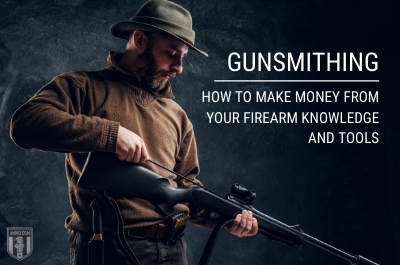 Here’s a question for all the preppers out there: how much do you know about repairing and modifying your own weapons? This is an important question, as your guns will only be able to defend you in a SHTF scenario if they are in proper working order. And the longer that the S keeps H-ing T F, the more likely it is that your weapons are going to break down in a manner that makes them difficult or impossible to use.
Here’s a question for all the preppers out there: how much do you know about repairing and modifying your own weapons? This is an important question, as your guns will only be able to defend you in a SHTF scenario if they are in proper working order. And the longer that the S keeps H-ing T F, the more likely it is that your weapons are going to break down in a manner that makes them difficult or impossible to use.
You don’t have to be worried about the end of the world to think about taking up gunsmithing. In fact, many firearms enthusiasts have taken a keen interest in gunsmithing simply because it can be a lot of fun. But more than fun, it can also be a way to make yourself a little coin, either on the side or as a replacement for a job you’ve lost – or one you’re dying to get rid of.
When we think of trades, we often don’t think of gunsmithing. However, there are a number of private companies and public institutions where you can learn everything you need to know about it. You’ll have to put your time in, have a business plan and have an aptitude for the material, but there’s potentially never been a better time to get into gunsmithing – with five million new gun owners in the United States in 2020 alone, you’re going to have a lot of potential customers in your market.
What Do Gunsmiths Do?
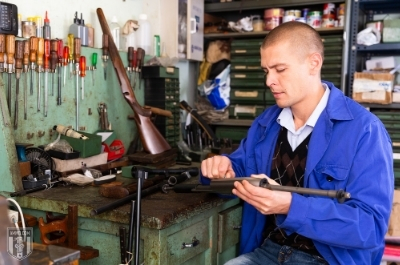 “What do gunsmiths do?” might sound like a question with an obvious answer. But as with most simple questions, the answer has a bit more depth than one might immediately think. So what exactly is a gunsmith and how do they spend their time? This is a question you must know the in-depth answer to before you even start moving the pieces of your life into order to get yourself on the path to a career in gunsmithing.
“What do gunsmiths do?” might sound like a question with an obvious answer. But as with most simple questions, the answer has a bit more depth than one might immediately think. So what exactly is a gunsmith and how do they spend their time? This is a question you must know the in-depth answer to before you even start moving the pieces of your life into order to get yourself on the path to a career in gunsmithing.
First, a definition by differentiation: an armorer is someone who merely replaces parts on a firearm. A gunsmith does much more than that. A gunsmith can repair and modify weapons, but he can also design them and create them from scratch. This is a far more detailed and nuanced skill set than simply trading one worn-out part of a firearm for a new one. Those with a creative bent will be attracted to the last two parts of a gunsmith’s job description: If you’ve ever wanted a weapon to be a very specific way, but didn’t know how to make your stock weapons to your own specifications, you can start making guns for yourself. And if other people have the same spec desires for their weapons, you can make a handsome living making guns for those people as well.
What this means is that gunsmithing is effectively an interdisciplinary craft. You will need to learn the finer points of both machine working and woodworking. Engineering skills are not optional. In practice, you will be making what might seem like maddeningly minor adjustments to firearms to better equip them for the personal purposes of the shooter. But to the gunsmith, these minor differences are a world apart from one another. Even when you perform simple repairs, you will likely be fabricating the necessary parts in your own workshop rather than simply swapping out spare parts that you have lying around.
Some gunsmiths focus much more on cosmetic alterations. This would include refinishing and creating intricate decorative carvings on the weapons. But even these will be cutting off a ton of potential customers without intricate knowledge of harder skills with regard to weapons design and repair.
Many gunsmiths start out working in gun shops rather than starting their own businesses. Others work in factories and armories designing and repairing weapons. Most gunsmiths have an area of specialization (such as pistols or hunting rifles), but will generally know a lot about repairing, designing and modifying weapons of all kinds.
Specializations Within the Trade of Gunsmithing
We mentioned that there are areas where you can specialize in the trade of gunsmithing. It’s worth diving into what the major areas of specializations are so that you can gain a greater appreciation of whether or not the trade is for you, as well as what kind of gunsmithing you might like to go into.
- Engraver: There’s no two ways about it – highly customized and aestheticized guns are just cool. And if you want to work simply with making guns more beautiful, this is a specialization area that might appeal to you. You’ll have to have a strong aesthetic sensibility. Since most of this work is done by hand with engraving tools, a steady hand and attention to detail are absolutely necessary. The downside is that most of what you do is going to be abstract spirals, leaves and dogs. Keep in mind that everyone who walks through your door will almost immediately say “I want” – which means you won’t get a lot of opportunity to do original designs of your own choosing.
- Stockmaker: A stockmaker makes customs stocks either because of aesthetic considerations or because a sportsman needs something highly specific. Stockmakers will work with shotguns more than anything, as these require highly customized stocks for the serious sport shooter. Stockmakers also often design and fabricate stocks for disabled shooters. Oftentimes, this specialization is combined with that of a checkerer, a gunsmith who specializes in adding checkering to stocks.
- Pistolsmith: As one might expect, a pistolsmith is one who specializes in the design, fabrication and repair of pistols and revolvers. This specialization actually requires you to know virtually everything about gunsmithing, but you will only be working with pistols. You will, however, learn a great deal about the specifics of how different crafts and trades apply to pistols as opposed to other types of firearms.
- Finisher: A finisher works with the finish of a firearm, subjecting the metal to a series of chemical processes (bluing, browning and Parkerization are three examples of this). This creates an aesthetic effect, of course, but it can also make the gun sturdier and more resistant to the elements.
- Custom Builder: Custom builders work with creating custom guns designed from scratch from the ground up for highly demanding customers who need weapons made to very exact specifications. This could be anything from highly specialized weapons for sportsmen or people looking for a very specific and stylized weapon for their personal defense or private target shooting. It might sound like the most generalized specialization and, indeed, it might be, but it requires a great deal of skill and knowledge to do successfully.
You might have an eye on specialization from the word “go,” but the likely case is that you will begin your career as a generalist, learning about different specializations as you go and eventually moving your career into one of them. Still, if one of these jumps out at you as much more interesting than another, you should focus on that and do the various steps that it will take to get there whenever the opportunity presents itself.
Where Can You Learn to Become a Gunsmith?
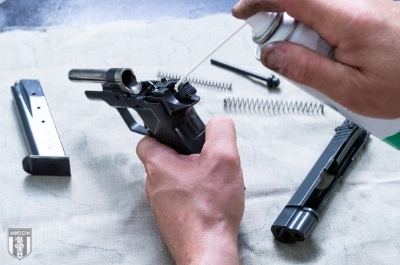 There are actually ample opportunities for you to learn how to become a gunsmith, but they all fall into four broad categories:
There are actually ample opportunities for you to learn how to become a gunsmith, but they all fall into four broad categories:
- The Military: Most people don’t know that the military will train you to be a gunsmith. It’s perhaps more honest to say that the military will train you to become an armorer, however, for many this is the first step in their career as a gunsmith. But there are bona fide gunsmiths in the American military, and while the positions are limited, they are certainly available. For example, highly smithed weapons are required for snipers. Every branch of the military has a place where you can study gunsmithing.
- Apprenticeships: This is a bit of a harder road, as you will need to find a practicing gunsmith with the skill set you are seeking who is looking to take on an apprentice. However, for many people it might be the best option, either because they don’t have the ability to enter the military or to take time off of work for schooling. As an apprentice to a master gunsmith, you will earn a wage while you learn your trade and you will learn in a very hands-on environment. This can be a highly effective way of learning and will fit certain types like a glove.
- Formal Education: There are two ways you can learn gunsmithing through formal education: First, you can attend a local community college with a gunsmithing program. Second, if no such program exists near you, you can enroll in a correspondence program that will allow you to distance-learn gunsmithing. In addition to these options, there are a number of programs through the National Rifle Association where you can learn the basics of gunsmithing. While this might not make you a master gunsmith, it will give you a basic set of tools that allow you to hit the ground running when you start a more formal and intensive course of study.
Each of these options has their own perks and detriments. You will have to evaluate your own situation with regard to finances and location to determine which is the right path toward becoming a master gunsmith for you and your family. In addition, while you're waiting, it can be fruitful for you to learn basic machine working skills, as these will be used extensively by you in your training as a gunsmith.
How Much Do Gunsmiths Earn?
Before you head down this path, you should also know that being a gunsmith pays decently, but you’re never going to get rich doing it. The average salary for a gunsmith is between $39,935 and $43,280 as of 2020. So if you’re thinking about packing in whatever career you have, you need to consider the financial aspect of this trade. You will likely make far less money than this for the first years as a gunsmith, as you will be inexperienced and in the process of building up your customer base.
Note that this figure also varies widely by state. The best paid gunsmiths live in Utah, Oregon, Nevada and Oklahoma, while the lowest paid ones live in Maine, Alabama and Georgia. Check out what gunsmiths are earning in your state to get a fuller picture of your financial situation before you start seriously pursuing this career.
There is also the small matter of employment trends in the field, which are on the decline – though the recent uptick in firearms ownership might be the beginning of a reversal of this trend. And while the trade itself is slowing down in growth, there is still a 13.7 percent increase in the number of gunsmithing jobs due to attrition out of the field. Those who are serious and committed and have the right training and aptitude will be able to find employment. Those who are less qualified in these areas will likely struggle.
On the upside, gunsmiths have a much higher-than-average level of job satisfaction. So while you might not become a millionaire making and repairing guns, you probably won’t dread going to work every day. What’s more, it’s not a trade that requires an extensive amount of training. Most gunsmiths have no more than two years of formal education before they begin their trade, though most of the good ones continue to learn after they have found gainful employment as a gunsmith. What’s more, gunsmiths typically have a standard 40-hour workweek.
Finally, remember that liking guns doesn’t mean you have a serious passion for them, nor the natural technical aptitude that is required to be a successful gunsmith. For some, the answer to this question will leap out quickly and immediately. For others, it will require some serious soul searching to decide whether or not this is the right career path for you and your family.
If you decide that gunsmithing isn’t for you, machine work, locksmithing and welding are similar trades that are not entirely focused on firearms.
What Are the Legal Requirements to Become a Gunsmith?
Those who closely follow gun politics in America know that almost every aspect of American gun life is heavily regulated. Gunsmithing is no exception to this and you will, unfortunately, need to deal with the Bureau of Alcohol, Tobacco and Firearms in your travels as a gunsmith. Like gun dealers, gunsmiths require a Federal Firearms License (FFL) to operate.
To obtain an FFL, you must be over the age of 21, be legally allowed to own firearms, not be guilty of any gun control violations, fully disclose all information requested on the applications, and have a premises appropriate for conducting business. Further, you must certify that your business will not be in violation of any state or local laws. Within 30 days, you are required to comply with relevant state and local business laws. You are not legally allowed to conduct business until these requirements are met. The chief law enforcement officer must also be informed of the intent to start the business. Finally, you must have secure storage for firearms on the premises.
This might sound like a lot of hoops to jump through and we agree. However, you can take some comfort in hearing that it only takes $150 to actually apply for the permit, which lasts three years. The permit renewal fee is the same.
You will also have to comply with state and local laws regulating gunsmiths, which are very different from one place to another. The ATF will make unannounced visits to your business to investigate and ensure that you are complying with all relevant laws and regulations. Note that you can work on any part of a gun without an FFL, with the exception of receivers, which are the part of a weapon that makes it a “gun” under federal law.
You are also legally restricted from working on firearms that you know or reasonably suspect to be illegal or illegally obtained. Finally, you may not modify a firearm in any way that would violate the law.
How Will 3D Printing Impact the Gunsmithing Business?
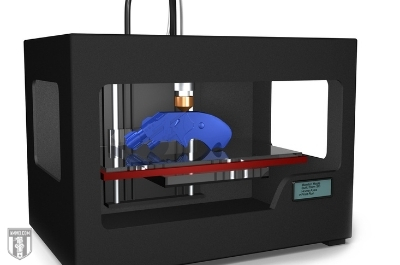 Much like automatic trucking, 3D printing is touted as the end of an industry. In the future, we are told by the pundits, all guns will be manufactured at home by people with 3D printers. But is this actually true?
Much like automatic trucking, 3D printing is touted as the end of an industry. In the future, we are told by the pundits, all guns will be manufactured at home by people with 3D printers. But is this actually true?
It’s probably closer to the truth that the kinds of people who are interested in becoming gunsmiths are the kinds of people who are going to be using 3D printers. While we’re already at the point where anyone who desires to do so can make their own guns – and even their own ammunition – people still much prefer regular guns made of metal or plastic to those made out of 3D-printing material.
This isn’t to say that there won’t be growth in the field of 3D-printed guns. Of course there will be. But there’s a very good chance that like self-driving cars, this is really a lot of bluster and hype. How many people do you know who only own a single gun? And how many of these are going to rely on something they printed at home as their primary means of self defense?
What’s more, even these weapons will require maintenance and repair. Anyone can print out a gun, but very few people can properly maintain them. It is worth picking up gunsmithing skills as they pertain to 3D-printed firearms, as this will only expand your customer base and prepare you for a career where such arms are more common, but they’re certainly not about to become the default anytime soon.
Could You Become a Famous Gunsmith?
While we stressed earlier that you are very unlikely to become rich anytime soon through the trade of gunsmithing, it’s not entirely out of the question. In fact, there are a number of gunsmiths whose names are almost synonymous with certain firearms. For those who are particularly skilled at innovative designs, you could become one of these rich and famous gunsmiths – but the passion, creativity and skills are definitely going to have to be there. Do not become a gunsmith because you’re banking on becoming the Jimi Hendrix of guns.
There are, of course, big names like Samuel Colt, John Moses Browning, Henry Derringer, Mikhail Kalashnikov, Benjamin Tyler Henry and William B. Ruger. But what are some of the newer hitters out there who managed to work their way up from a humble gunsmith into having their own line of firearms to peddle in gun stores from sea to shining sea?
Well, he might not be a household name, but Les Baer and his Les Baer Customs are a good example of just how far you can go if you’re really, really good at providing people with something unlike anything else.
Baer specializes in two firearms. Fortunately, they’re two of the most popular weapons in the United States: the 1911 and the AR-15. Along with Smith & Wesson, he is the only entity authorized to use the Clint Smith Thunder Ranch logo on his wares. Baer guarantees 3” accuracy at 50 yards, but you can pay an extra fee to get 1-½” accuracy at the same range.
Perhaps more familiar to you is Bond Arms, which makes the industry-standard Derringers in the world today. This company was founded in 1995 by Greg Bond, a veteran tool-and-die maker, in Granbury, Texas.
Barrett Firearms Manufacturing was founded in Christiana, Tennessee, in 1982 by Ronnie Barrett. The company spent seven years slaving away before sales picked up, supplying weapons to Sweden. The Barrett M82 was the first 50 cal available for consumer purchase in the United States. The company now supplies the United States military as well as a number of municipal police departments.
Finally, there is Daniel Defense, regarded by many as the premier manufacturer of AR-15 builds in the United States today. This company was founded by Marty Daniel in Savannah, Georgia in 2002.
What do all of these companies have in common? They either offered something no one else did, became really good at doing one or two things, or some combination of both. If you can find a niche within gunsmithing like these companies, there’s no reason that your last name can’t be associated with the finest firearms in all the land.
Related Skill Set: Blacksmithing
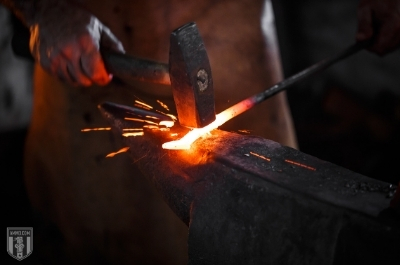 If you want to truly be prepared for a SHTF scenario and want to offer a unique skill to your potential gunsmithing customers, then blacksmithing is a craft you could consider learning concurrently with your gunsmithing education.
If you want to truly be prepared for a SHTF scenario and want to offer a unique skill to your potential gunsmithing customers, then blacksmithing is a craft you could consider learning concurrently with your gunsmithing education.
Even if all the power goes out, you will still be able to blacksmith the parts you need for weaponry. In the meantime, you can make highly customizable parts for the guns you are making.
With blacksmithing, you are fabricating your parts in a forge, which is effectively an extremely hot oven. This is a much more physical way of fabricating parts than machine work. You will have to heat up metal to very high temperatures, then manipulate it into place using direct physical force.
Blacksmithing also requires a greater deal more attention than machine working. Anyone who has worked in a machine shop knows there are plenty of machine projects that don’t require a lot of babysitting from the worker. You can simply set the machine up and let it do its work. With a forge, you have to monitor the forge constantly, not just for safety reasons, but to ensure that you get the right finished product.
Being a blacksmith-based gunsmith will appeal to a specific type of person – someone who wants to engage in one of the oldest trades known to man and isn’t afraid of getting hot and dirty on a daily basis. You will have to get very physical crafting your parts, but you will also have a far greater deal of control over the raw materials and thus the finished product, allowing you to offer a superior product to your customers (provided that you are both a skilled blacksmith and a skilled gunsmith). Your customer base will primarily be people interested in antique firearms and modern versions thereof.
And if things ever take a turn for the worse, you’ll be both very prepared and very popular.
Getting Started With Gunsmithing
In advance of a career in gunsmithing, there are things you can do to pick up some basic skills as well as get more practice working with the specific parts of guns. For example, you could start disassembling and cleaning your guns for your friends and family, either for the experience or for a fee – there might be local laws restricting you from transacting this as business, but you don’t need an FFL to clean guns for a few bucks.
Otherwise, you can start by working on and doing some smithing for your own weaponry. If you decide not to pursue gunsmithing as a trade, you might find that you have a knack and a passion for tinkering with your own guns. Remember that while it is not illegal to work on your own guns, it is illegal to perform certain modifications to your weapons. You should have some working familiarity with gun laws before you start modifying your guns.
That might not get you ready to start fabricating guns from scratch, but it will give you a lot more time with your hands on the component parts. That kind of experience will be important when you take a more formal course of study.
Gunsmithing is a calling more than it is a career. Some tinkering with your own weapons will not only give you experience – it will also give you a solid idea of whether or not this is how you want to spend 40 hours a week for the next several decades.
Gun Rights
- Federal Gun Control in America: A Historic Guide to Major Federal Gun Control Laws and Acts
- State Gun Control in America: A Historic Guide to Major State Gun Control Laws and Acts
- The Supreme Court and the Second Amendment: Understanding the Court's Landmark Decisions
- Early American Militias: The Forgotten History of Freedmen Militias from 1776 until the Civil War
- American Militias after the Civil War: From Black Codes to the Black Panthers and Beyond
- Negroes With Guns: The Untold History of Black NRA Gun Clubs and the Civil Rights Movement
- American Gun Ownership: The Positive Impacts of Law-Abiding Citizens Owning Firearms
- 3D-Printed Firearms and Defense Distributed: A Guide to Understanding "Ghost Guns"
- Commercial Ammo: The Untold History of Springfield Armory and America's Munitions Factories
- Gun Background Checks: How the State Came To Decide Who Can and Cannot Buy a Firearm
- The American Old West: How Hollywood Made It “Wild” to Make Money & Advance Gun Control
- Prescription For Violence: The Corresponding Rise of Antidepressants, SSRIs & Mass Shootings
- If It Bleeds It Leads: How the American Media Perpetuates and Profits from Mass Shootings
- Deplatformed: How Big Tech and Corporate America Help Subvert the 1st and 2nd Amendments
- History of the ATF: How the Bureau of Alcohol, Tobacco & Firearms Became Corrupt & Abusive
- Joe Biden on Gun Control: Understanding Biden's 2020 Platform and the Second Amendment
- Gun Control and Racism: The Laws and Taxes Meant to Limit Minority Gun Ownership in America
- Protection or Pain Treatment: Choosing Between Your Gun and Medical Marijuana
- Gunsmithing: How to Make Money From Your Firearm Knowledge and Tools
- Collectible Weapons: How to Protect Your Wealth – and Your Family – With Valuable Guns
- How to Build a Gun Club: A Guide to Organizing and Starting Your Own Local Gun Club
- Are Hollow Points Illegal? Understanding When & Where You Can Use HP Bullets
